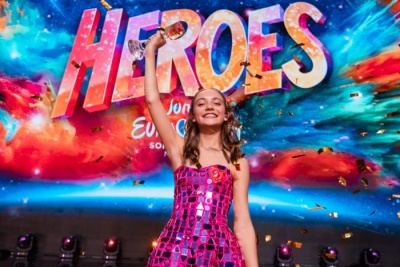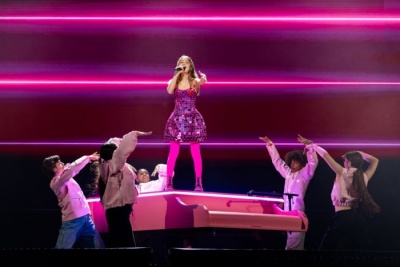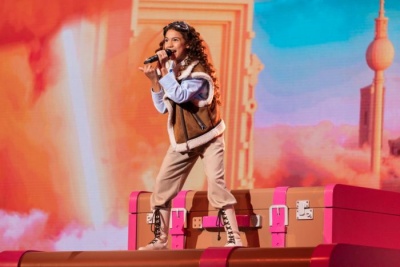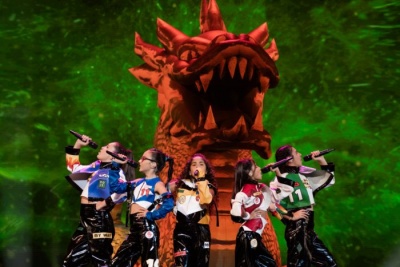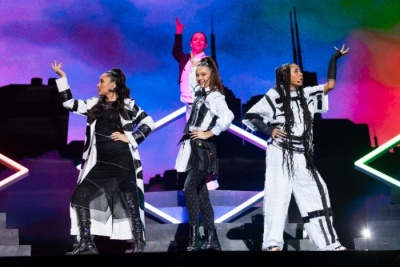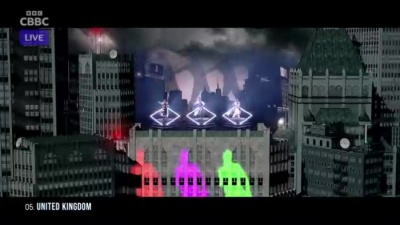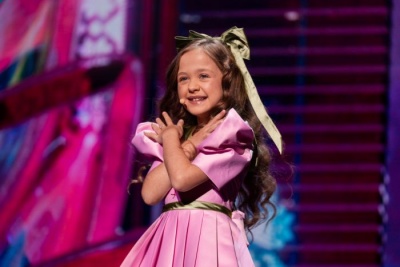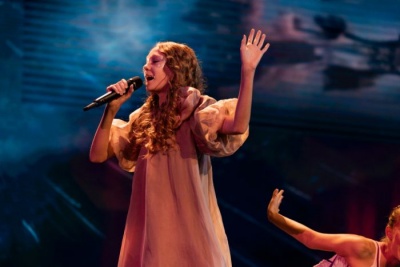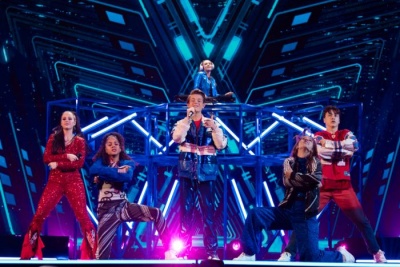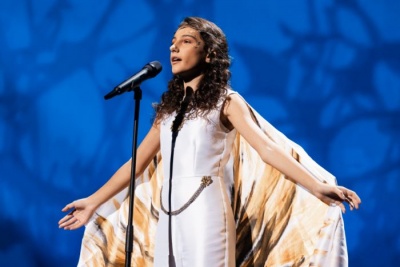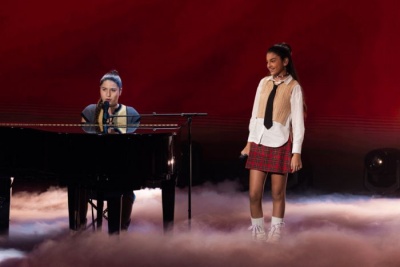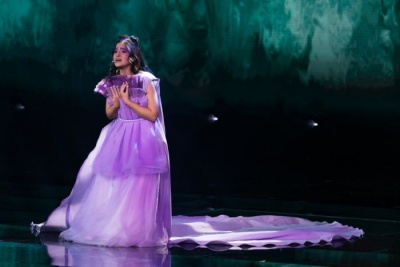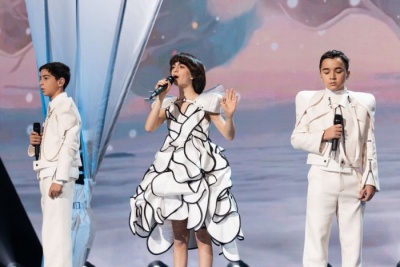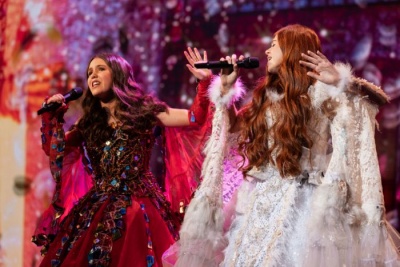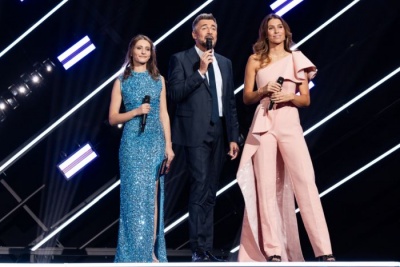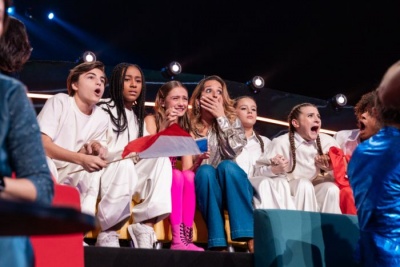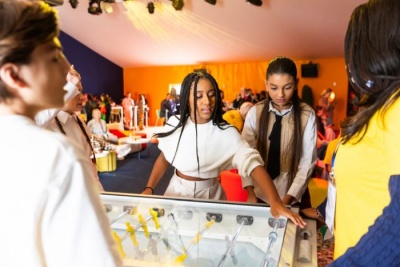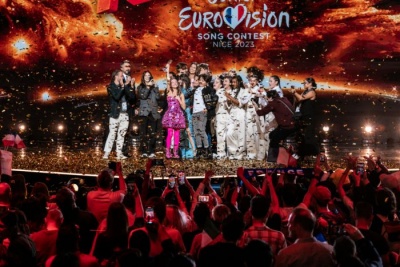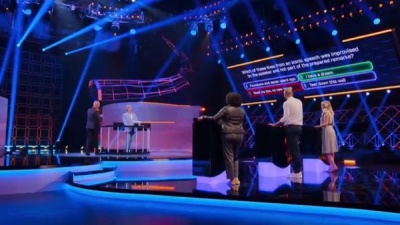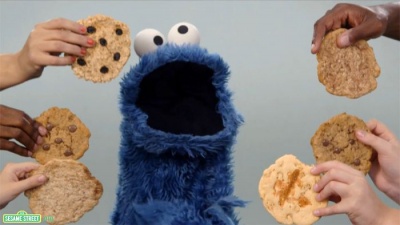Weaver's Week 2023-12-03
(Created page with 'Last week | Weaver's Week Index | Next week "What's the weather like in the south of France?"<br> "Ni…')
Current revision as of 11:32, 3 December 2023
Last week | Weaver's Week Index | Next week
"What's the weather like in the south of France?"
"Nice."
"Where's Palais Nikaïa?"
"Nice."
"The cuisine?"
"Nice."
"Hotels?"
"Nice."
"Music?"
"Brilliant."
Contents |
Junior Eurovision Song Contest
France Télévisions for EBU, 26 November 2023
Who won? The home team.
"Cœur" – Zoé Clauzure represents hosts France Télévisions (shown as "France" on screen). We see Zoé at a pink piano, which turns out to be shaped like a heart. Much of the first verse takes place from behind a wall of uplights, and the whole performance is in a small square. Five dancers in white join Zoé on stage, the video wall spells out "hope" and "love". The song is uptempo, clear in its message, and the staging is memorable. Goes down very well in the hall, natch.
The visuals made the performance stand out – Zoé's dancers spent most of the time circling that big pink piano, while Zoé stands and sings on top. "Cœur"'s music was written by Julien Comblat and Jérémy Chapron, the lyric by Noée Francheteau – and written for international comprehension. Even if you don't understand a word of French, you'll have got the message of love and optimism and hope.
"Cœur" would go on to be the consensus winner: it won the jury vote by 20 points, and the public vote by a clear margin. It's a worthy winner, it went down a storm in the hall, it looked tremendous on screen. As hosts, France Télévisions did what little they could to clear their path – they put slower songs before and after, and many of the favourites some distance away.
"Cœur" is a tremendous Junior Eurovision song, fully deserving of its win. FT aren't the first host broadcaster to win, TVP repeated in 2018 and 2019. The French are the first to do it with very different songs, going from last year's jazz to straightforward pop. One theme runs through all their entries: bright and attractive staging, everything jumps out from the telly and demands to be noticed. About 30% of internet voters gave one of their three ticks to "Cœur", proving it worked at home. (This year, we're giving the public vote as approval ratings to the nearest 0.5%, we think this is more meaningful than raw scores.)
Podium places
Second place to "Loviu" – Sandra Valero from RTVE ("Spain"). Reclining on a packing case, backing dancers have suitcases. Everyone's dressed as an old-fashioned aviator, with goggles and tan jacket. The song is very much the opening number to a children's adventure film in the live-action Disney idiom, with just enough modern touches to pass muster for 2023. Video screens show various landmarks around the world. Very very big opening number.
"Loviu" came third with the juries, moved up a spot after securing 28% approval at home. They held a random draw to determine which song opened, and that draw did a wonderful job once again. We're off on a magical tour, going places and meeting new friends.
Indeed, we reckon the show works better if you skip the opening fifteen minutes and begin with this song's postcard. What will you miss? Lissandro, the young singer from last year, opened the show with a montage of his dreams – in space, in nature, flying into the Nice Arena. He led the common song, "Heroes"; the backing dancers are wearing blue bacofoil suits, the contestants stand out by wearing normal clothes. "Heroes" is the slogan and theme of this year's contest; specifically, the children who make the world smile.
France Télévisions has a busy year in 2024, there's a big sports event happening in Paris during the summer, and they've staged JESC twice in three years. We wouldn't be too surprised if they decide to pass on next year's JESC. If that happens, RTVE will be in pole position to take the show: they haven't hosted any television Eurovision competition since the 1969 Senior Eurovision, and surely they've got to have had some brilliant ideas over the last 55 years. (No JESC, no Eurovision Young Musicians or Eurovision Young Dancers, not even a Jeux Sans Frontieres final. For absolute completeness, RTVE did host the 2019 final of Let the Peoples Sing, a radio competition for choirs.)
And if RTVE pass, we know exactly what the weather is like in Yerevan. "Do it my way" – Yan Girls are the five-piece act representing AMPTV ("Armenia"). The broadcaster's been re-writing the book on Eurovision success lately; 2021 winner Malena co-wrote the lyric. It's another very modern song, centred around K-pop's syncopated beats. The girls are colour-coded in otherwise similar outfits, preserving a bit more of their individual personalities than Five Star managed. The song is an empowerment anthem, staged with confidence and verve and more than a little wit. And a dragon on stage, because all songs need a dragon on stage.
This one jumped out of our earbuds when we tested the songs in early November, and it was first on our list to get a vote. The staging was unhelpful – lots of fast cuts during the dance break left us giddy, it compares badly against "Unicorn" from the Senior contest last spring. About 20.5% of voters ticked this box, and the juries put it second – albeit just one mark ahead of "Loviu". We'd be fascinated to see a breakdown between the three music professionals and two children on each broadcaster's jury, this song has to have polarised opinion like Marmite.
The BBC did well
Also earning a vote from this column, "Back to life" – Stand Uniqu3 of the BBC ("United Kingdom"). While watching the trio perform on Children in Need and Blue Peter, we'd been confused by the diamonds in every performance – Hayla, Maisie, and Yazmin stood on tilted squares, and did much of the song standing separately. A recreation of the final round from Raise the Roof? No, something much cooler – they're standing on rooftops in a city, made by augmented reality.
Computer effects replaced the audience with more of the city, so our power trio stood tall and dominated their world. Shadows enhance the mood, just as Käärijä did in the grown-ups contest earlier this year. The choreography is simple, but it only works from a limited set of camera angles, because anything else will break the AR. It's a mercy when they come down for the middle eight, and backing dancers take their place on the rooftops. "Back to life" is very much a song of the moment, the woozy beat and off-key whistling will date it to late 2023.
This was a stupendous performance. Hats off to the young singers, and to the backing dancers. Chapeaux also to Lee Smithurst and Dan Shipton, the BBC's creative geniuses who came up with this innovative staging. ESC Insight have a great piece on how they staged "Back to life", with input from the group themselves. Many songs have tried to beat what "Heroes" did in 2015; climbing walls and green-screen effects and lyrics and a robot host. If you'd have told us two years ago that the Beeb would raise the bar on augmented reality, and do it at Junior Eurovision, we'd have thought you quite bonkers.
This whole week meant a lot to the Stand Uniqu3 trio, and they got totes emosh talking to Ophenya in the green room. Fourth place with the juries, seventh with the public (19% approval), fourth place overall. It's another tremendous result from the BBC.
Five, six, seven
These three finished on almost identical scores. Fifth place to "Kvitka" – Anastasia Dymyd represents UA:PBC ("Ukraine"). Very cute and innocent young girl in a frilly pink dress, singing about flowers. After the sweetly pretty opening verse and chorus, the stage goes red, anime characters on the backdrop look more evil. She clutches a wand hoping to bring things back to life. Four backing dancers, two in matching pink, two in contrasting lime green. Charming visually, but we found it to be wallpaper as a song. Juries put it quite low, but there was a massive televote, 27% approval.
In sixth, "I just need a friend" – Maja Krzyzewska for TVP ("Poland"). A backdrop of pictures of Maja as a youngster, the line "a small town girl in an endless world" comes straight from the Duncan Laurence songbook. It's a pink chiffon dress, with four dancers from a ballet school. As one might expect from the title, the song's all about the power of friendship. The sentiment is timeless, and the execution a tiny bit clichéd – this is the song of a desolate hero, halfway through the second act of a musical, when Junior Eurovision is usually won by the finale or the pre-interval showstopper. Did well with the juries, and stood out as best of the slower songs.
Seventh place went to "Holding on to you" – Sep and Jasmijn for NPO Zapp ("Netherlands"). She's in a sparkly dance suit, he's in a tracksuit jacket. The song is A Banger, lots of flashing lights and uplifting dance beats, it could feature on NPO 3fm without blinking an eyelid. This was quite a cluttered performance, with three backing dancers and a deejay pretending to spin the decks. The best attempt we've seen at conveying rave-dance-house music on television, perhaps because it doesn't reach for the box of video tricks used on every Top of the Pops circa 1988. But it is only seventh, which is probably the ceiling for EDM bangers – it's the music of the previous generation, too old for JESC. A very high-energy closer, and the closing song is picked at random – 22.5% of home votes ticked this one, including our vote.
Also competing
We'll take these in scoreboard order, starting in eighth place.
"Bota ime" – Viola Gjyzeli of RTSH ("Albania"). Every Eurovision contest needs a woman in a white cloak and an interesting lining. Viola's pulled that card. "Bota ime" is in waltz time, a commanding song that needs a really strong voice, and Viola had that in spades. Got marked down for coming after France, which is most unfair.
Fourth in the internet vote was the penultimate song, "Ohne worte". Fia represents KiKA ("Germany"), returning after a year's creative pause. The song translates as "without words", referring to Fia's use of sign language to communicate with her sister who is also on stage. Pink is the dominant colour of outfits and backdrop; the song left us quite cold, but connected with 24% of voters, so what do we know?
"Stronger" – Yulan, PBS ("Malta"). Dark stage, black-clad girl, sings about needing patience, hope, and getting there. The juries saw a different performance from us, as Yulan strained for some of the vocals, and a lot of the melody's came from backstage.
"Un mondo giusto" – Melissa and Ranya sing for RAI ("Italy"). Two girls in casual outfits, one sings at a piano, the other standing up; all the props disappear after the first voice. It's a song about friendship, the power of having someone who's got your back, and is very moving in its own way. Surprised this didn't connect with the viewers or the juries, it's straight into our playlists.
"Kaži mi, kaži mi koj" – Tamara Grujeska sings on behalf of MKRTV ("North Macedonia"). Heartfelt slow song by a girl in a hoodie. Makes the emotion clear by tone and action, even if we don't speak a word of Macedonian (and we don't speak a word of Macedonian). Breaks into English for the second verse, and the bleak backdrop changes to a psychedelic spring scene with pink everywhere; Tamara's grey clothes still make her stand out.
"Where I belong" sung by Júlia Machado for RTP ("Portugal"). She starts by singing while lying down, which is difficult; then continues singing as she rouses herself from a nap, which is almost impossible. Juries didn't reward this daring, for shame. The emotional stall is set out in the first chorus – "I wanna go to a place where I belong", it's homesickness and longing. Júlia has a purple dress and eye makeup that makes it look like we're interrupting a quiet blub. This could be the pre-interval showstopper, the heartsong of a hero who now knows what she's doing. We're going to come back to this in a few months and we're going to love it.
When we come back to "Over the sky" we'll still think "eh?" Anastasia and Ranina sung for GPB ("Georgia"). Ranina turns out to be two lads wearing white suits; Anastasia has stepped out of a Lady Gaga video, wearing a white dress with plastic shoulders. Two other dancers have billowing sails going up towards the roof. It's all pleasant, if some of the vocals are a little scratchy, but we had no clue what was going on, and this was memory-holed by "Cœur" a few minutes later.
"Hoiame kokku" – Arhanna sings the debut entry for EER, Estonia's national broadcaster. Another dress with remarkable sleeves, the red scarf provides the only splash of colour. Backdrop is the inside of a clock, and there's a pendulum banging away through the song. It's dark and intense, and it's going to be a song we like a lot on about tenth listen. Doesn't help for a contest where you've got to make an impression on first listen.
Someone has to finish last, this year it's "Aisling" – Jessica McKean for TG4. Long red dress with attached arms, zillions of hand-sewn sequins add colour. Misty tree-lined moors and a gentle folk song to conjure up ideas of postcard Ireland. It worked well for TG4 last year, did decently in 2019. Jessica uses a powerful chest voice and delicate head tone. Joined for the finale by another young woman in a matching white dress – gosh, if it isn't lyricist and last year's singer Sophie Lennon! Very very good, if we'd had a fourth vote it would have gone here. Sadly, while this is a great song, it isn't a great competition song.
Other matters
Our hosts were television legend Olivier Minne (you might know him from Fort Boyard or the 2021 contest), Laury Thilleman (former Miss France, regular host of music spectaculars for France Télévisions) and Ophenya (Tiktok sensation and green room correspondent).
The green room bits included how the EER and KiKA entries met at Frankfurt airport and have been inseparable since, and a treacly "hello, mom" from TVP's singer. These segments were pre-arranged, they'd given notice of the questions because everyone was talking in slightly stilted English, a foreign language for everyone. As much as we love the innocent Lauren Layfield, and the normal Hrvy, they might not have talked over all of the French language bits.
And there were a lot of bits: three internal breaks while they set up staging (curiously, for three of the top four), filled by more semi-scripted chatter from the green room. Variety is the spice of life, producers! Couldn't they have had some quick video packages from the opening ceremony / contestants backstage / out and around Nice?
While the voting progressed, two interval acts featured Lissandro from this contest last year, and Amir from Senior 2016. Immediately afterwards, pianist Yan Tan played some songs by ear, a trick they'd also shown on the opening ceremony draw earlier in the week. It's all very French, and we're not sure how interesting it was for viewers elsewhere in the world. The entire class of 2023 joined in a version of "We are the world", very carefully introduced as a song for general peace without mentioning any of the violence going on around the planet. Children singing a song written by Michael Jackson back when their parents were in nappies is a bizarre concept, but it functioned on stage.
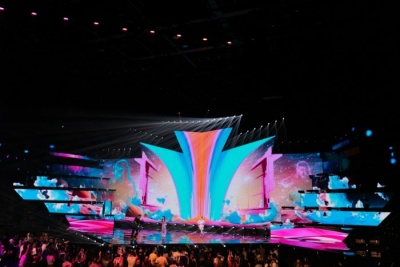 The stage looked a bit like a maple leaf. A small platform in mid-stage could add some extra elevation, as used by the BBC.
The stage looked a bit like a maple leaf. A small platform in mid-stage could add some extra elevation, as used by the BBC.
Everything was going fine, except for the final reveal of the winner. Olivier really dragged this out; it's one thing to ramp up the tension, it's quite another thing to get this column to think, "oh, do get on with it, you could be served a three-course meal at Chez Willy in this gap." Far beyond the point of reasonableness, and we wonder if it's wholly consistent with the EBU's pledged duty of care. Even the upbeat and positive Lauren Layfield and HRVY were irritated by the delay, and when Lauren Layfield is irked, bad things happen.
But this passed, and the winner was confirmed, and Zoé performed "Cœur" again. As is traditional, she's joined by all of the other performers for one last moment of group togetherness.
Ten years of Junior Eurovision reviews
This was the tenth Junior Eurovision Song Contest it's been our pleasure to review. Looking back on our 2014 notes, we see the contest has changed a lot, and for the better. We don't have to seek out an obscure audio stream on the internet wilderness, JESC now comes through our mainstream telly aerial. No longer a redoubt of eastern Europe plus the Netherlands, Junior has entries from all of Eurovision's Big Five.
The television show is at a more sensible hour, it doesn't go on past midnight in Tbilisi, long after children have gone to bed; 3pm in Salford is 7pm in Baku, with an implicit promise to parents that they'll be off air by 9.30 and let the young viewers be tucked up in bed by 10. We don't have under-rehearsed acts like The Peppermints; these days, we have well-rehearsed and perhaps over-produced entries like "Do it my way". We never have many solo lads – one in 2014, precisely none this year, and we don't know why this is, and it does give us cause to pause.
Most tellingly, Junior Eurovision has grown up and matured. Our abiding memory of the 2014 contest is "Happy day", a song so juvenile and colourful it sent light streaming out of our radiogram. We don't get such childish songs any more, and Junior is better for it. Sure, we get youthful songs – "Cœur" and "Back to life" and "Loviu" would not work at Senior Eurovision – but we don't get sugarplums and lollipops any more.
Real life isn't sugarplums and lollipops, it's got ups and downs, highs and lows. Junior Eurovision has the emotional intelligence and maturity to deal with difficult concepts, to address them honestly. The broadcasters have the faith in their youngsters to handle life's setbacks, and the result is a more honest show. We hesitate to use the cliché "age-appropriate", because it is so subjective, but JESC is laser-targeted at its audience aged 9-14; that it serves other ages is a bonus.
When we started in 2014, we had a slight fear that we were chronicling the last years of Junior Eurovision. We're glad to have been proven wrong; as the contest marks its 20th birthday, it finally seems to be accepted as an integral part of Europe's culture. Next year, in a city to be confirmed!
In other news
Two game shows won at this week's Rose d'Or Awards. The 1% Club, winner of the Rose d’Or for Studio Entertainment. Destination X, winner of the Rose d’Or for Competition Reality.
The head of Netflix says that he wants the company to expand into shiny floor entertainment and game shows. By "shiny floor", he means studio-based light entertainment programmes – shows like The Masked Singer, the Got Talent franchise. Would Netflix be prepared to dangle megabucks in front of Simon Cowell to make him jump ship?
And Netflix want game shows – quizzes and general silliness. If Netflix had been around in the 1990s, we can be sure they'd have bagged Gladiators by the armful. If they'd been around in the 2000s, all the international Big Brother versions you can muster. These days? The Traitors is popular in most international markets (though not Australia), and antiques always attract an audience.
It's fair to say that Netflix's previous forays into this genre haven't worked – Cheat and Bullsh*t lasted one series, and The Big Flower Fight didn't get any traction at all. Squid Game: The Challenge is moderately popular – the streamer says that global viewing figures average 40 million for the first five episodes, BARB's official figures won't be out till next week. But how many game shows based on Netflix's existing programmes can they make? A Wednesday goth-off in the celebratory style of Drag Race could work, but a contest of Black Mirror would undermine the main show's premise, and The Witcher is merely Raven without the interesting bits.
Successful streaming shows are popular, bingeworthy, and each episode is contained. Look at the sort of thing the Challenge channel shows – The Chase, Bargain Hunt, The Weakest Link, The Crystal Maze. Find something as good as those shows, build an audience – perhaps by giving away some episodes for free, perhaps by selling them to other broadcasters – and success is possible.
Netflix's problem is that it's full of arty-farty high-faluting shows that you have to watch intently. They don't make background television, and many of the best shows are background telly that we can dip in and out of. If Netflix tries to come into our space and makes something too complicated, failure will surely follow.
Quizzy Mondays
Last BBC Brain semi-final. After a flat opening round (3-3, 3-3), Matt Barr took a small lead in the next round, only for George Scratcherd to pick up one of his own, and all three bonuses from other players' errors. More bonuses allow George to stretch the lead further, and the final round proves a formality, Sue Brookes ends up in second place with 10 marks. Very much won on the bonuses – George's final total of 16 includes no fewer than 10 picked up from other players' errors. Will he get such luck in the final? Tell you next week!
Scott Torrance won a low-scoring Mastermind, one of three contestants on 19 points. He'd had many near misses on his specialist round of the New York subway, but caught up with a storming general knowledge. Pamela Fell had a more shaky second round after taking The Oceans films; Damian Pugh had a tactic to pass on the novels of Donna Tartt, the extra questions didn't allow him to eke out the win.
Isotopes took the final place in the Only Connect quarter-finals, beating the Gardners 26-16. Low scores early in the game, in spite of accessible subjects like Dragons' Den and inventions described as flops. (Betamax, a flop? That's harsh!) Five of the first nine questions scored for neither side, perhaps too many for this stage of the contest. Loved the question on distances between places with the same name, and the Gardners kept themselves in it by spotting French cities at the end of certain words. Missing Vowels fell for the Isotopes, so did the game.
Another match between credible semi-finalists on University Challenge, where UCL overcame Hertford Oxford by 225-140. The Oxford side got the stronger start, but once UCL hit their stride (a set on Tauchnitz's collection of paperbacks, of all things), it was one way traffic. Incorrect interruptions were part of UCL's plan: risk a bit to gain a lot.
Oh dear An episode of Christmas University Challenge won't be broadcast after two contestants complained they hadn't received provision for their disabilities. Promises of audio description for the visual rounds, and subtitles for another contestant, were not met by producers Granada Television. BBC News reports that this missing heat will not alter the results of the series, which will go out over the Christmas break. We will offer one opinion: if this had come to the attention of the old host while in studio, he'd have moved heaven and earth to make sure the contestants were looked after.
Quiz digest
A semi-regular snapshot of interesting things we've heard and seen. Commit them to memory and they might help you win a pub quiz, or prove yourself smarter than Uncle Reg.
- Aussie Rules Football was devised by Thomas Wentworth Willis, in order to keep cricketers fit during the winter. A blend of running, kicking, bouncing balls on the ground and whistles, cricket is played very well by Aussies. (BBC Brain)
- Elizabeth Windsor may not have been a good television critic, but she was a familiar on the cover of the Rusty Old Radio Times. No fewer than 47 editions of the BBC's weekly organ featured Mrs. Windsor, even more than David Attenborough and Doctor Who. (BBC Brain)
- Ciabatta bread was invented as recently as 1982. The Bread Marketing Board of Italy wanted to come up with a rival to the baguette. Other new consumables introduced that year include Bud Light, Diet Coke, Vienetta, and Ferrero Rocher, but Lymeswold. (House of Games)
- During the 1916 Easter Rising, there was a regular pause in the fighting so that the ducks on St Stephen's Green could be fed. Park keeper James Kearney would enter the Green daily to feed the waterfowl; when he did this, the opposing sides of the Irish Citizen Army and the British forces would cease fire. (Mastermind)
- We know him as Cookie Monster, but to his bank manager, he'll always be Sid. (House of Games)
- The keyboard shortcut for œ is Alt+0156. Cœur.
Lots of finals this week. BBC Brain crowns its 2023 champion (Radio 4, Mon), Wales' Home of the Year is named (BBC1 Wales, Fri), and Masterchef The Professionals concludes (BBC1, Fri).
Be careful if you're expecting Celebrity Antiques Road Trip on BBC2, as regional variations make this week exceptionally confusing; House of Games (3) is on a 24-hour delay in Wales and Northern Ireland.
Pictures: EBU / Corinne Cumming, EBU / France Télévisions / BBC, Nobody's Hero / ITV America, PBS / Sesame Workshop
To have Weaver's Week emailed to you on publication day, receive our exclusive TV roundup of the game shows in the week ahead, and chat to other ukgameshows.com readers, sign up to our Google Group.

